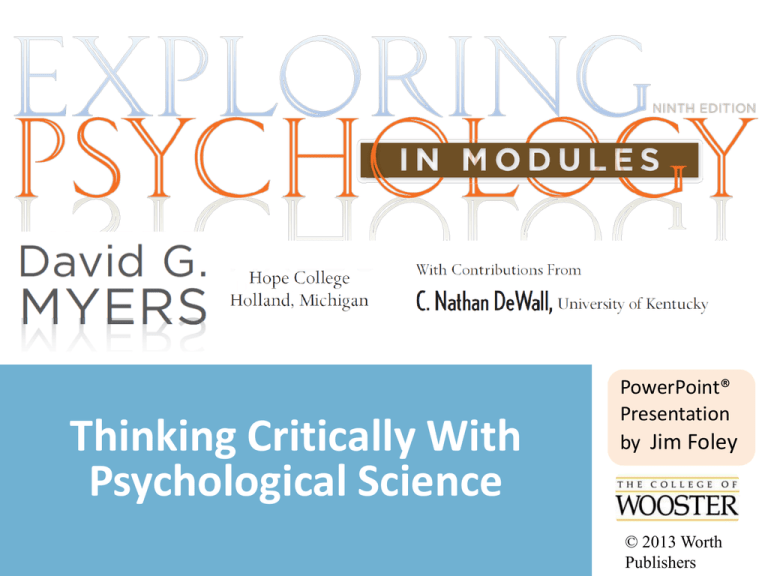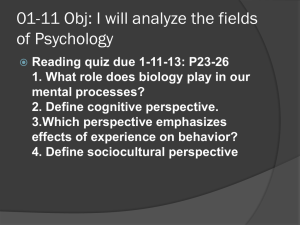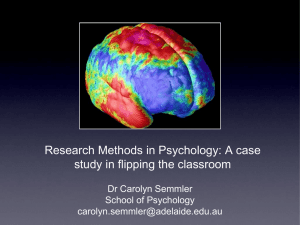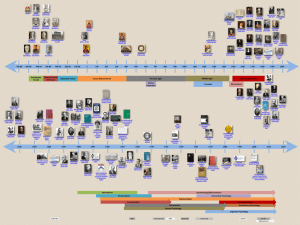History and Scope of Psychology
advertisement

Thinking Critically With Psychological Science PowerPoint® Presentation by Jim Foley © 2013 Worth Publishers Module 1: The History and Scope of Psychology Topics and Questions The origins and growth of psychology, from questions to a science The big question: do our human traits develop through experience (nurture), or are we born with them (nature)? Psychology’s biopsychosocial levels of analysis Psychology’s subfields Applying psychology to learning the text: SQ3R Psychology is about understanding mind, self, and others. Bring your curiosity to class, with questions like: How do I explain dreams? Anxiety? The abilities and funny behavior of babies? How can I learn to use my mind to be more successful in my life? To be more effective in helping others? From speculation to science: The Birth of Modern Psychology Aristotle (4th century BCE) had ideas about how the body and mind work. His method: making guesses. Wilhelm Wundt (1832-1920) added two key elements to help make psychology a science: 1. carefully measured observations 2. experiments Wilhelm Wundt’s 1879 experiment measured the time it took for people to: Push a button when a ball dropped (based on when they heard the ball hit a platform): 1/10th of a second. Push a button when consciously aware of hearing the ball hit the platform: 2/10ths of a second. Why were the times different? Structuralism Edward Titchener, like his teacher Wundt, used data from introspection, reporting on sensations and other elements of experience. Structuralism: Using these introspective reports to build a view of the mind’s structure Functionalism: The school of thought that Psychological processes have a function: helping us survive as individuals, adapt as a species William James The developer of functionalism, William James (1842-1910), asked: How did the human style of thinking and behavior enable our ancestors to live long enough to reproduce? James mentored another pioneer Psychology Pioneers Mary Whiton Calkins (1863-1930) became a memory researcher and the first female president of the APA. She studied with William James but was denied a Harvard PhD. Why? Because of her gender. Mary Whiton Calkins Psychology Pioneers Margaret Floy Washburn (1871-1939): The first female to earn a Psychology PhD The second female APA president Author of The Animal Mind. Margaret Floy Washburn, PhD Shifting definitions of “psychology” Wilhelm Wundt and Edward Titchener, around 1900: “The science of mental life.” Johncombine B. Now we and theseWatson definitions: B.F. Skinner, behaviorists, “The science of 1920’s: “The behavior scientificand study of mental observable processes.” behavior.” Cognitive psychologists, 1960’s, studied internal mental processes, helped by neuroscience. Trends in Psychological Science: Behaviorism Behaviorists study and experiment with observable behavior. Watson experimented with conditioned responses. John B. Watson Skinner studied the way consequences shape behavior. Like other behaviorists, he saw little value in introspection. B. F. Skinner Trends in Psychology: Freudian/Psychoanalytic Psychology Sigmund Freud, founder of psychoanalysis: He studied and helped people with a variety of mental disorders. More about Freud when we study personality and therapy Sigmund Freud Trends in Psychology: Humanism Abraham Maslow Carl Rogers Humanists: Abraham Maslow and Carl Rogers (1960s): studied people who were thriving rather than those who had psychological problems. developed theories and treatments to help people to feel accepted and to reach their full potential. The Growth of Psychology Psychology’s pioneers have come from many fields: physiology, philosophy, medicine, and biology. Advances in psychology also have been made in many countries Psychology has spread rapidly; there are 71 member nations in the IUPS. The subjects studied in psychology have multiplied too… as we shall see in this course. The Big Issue in Psychology: N-N The NatureNurture Question: To what extent are our traits already set in place at birth (our “Nature”)? And to what extent do our traits develop in response to our environment/ experience (our “Nurture”)? Descartes: Some ideas are innate. Plato: Ideas such as “the good” and “beauty” are inborn. Nature Charles Darwin: Some traits become part of our nature through natural selection: they help us survive long enough to pass the traits to the next generation. Aristotle: All knowledge comes through the senses. vs. Nurture John Locke: The mind is a blank slate (blank chalkboard or screen) “written on” by experience. We share a common origin that Nature gives us an inborn human nature in common. + We have differences Nurture that are shaped by our environment. The Roles of Nature and Nurture: “Nurture works on what Nature endows.” Biology Plus Environment.. are part of psychology’s three “biopsychosocial” levels of analysis. The deep level, Biology: genes, brain, neurotransmitters, survival, reflexes, sensation In the middle, Psychology: thoughts, emotions, moods, choices, behaviors, traits, motivations, knowledge, perceptions The outer level, Environment: social Influences, culture, education, relationships The three levels as influences on some psychological phenomenon Example: Example: Example: Example: Enjoying Depression Intelligence Shyness Soccer There are many perspectives for describing psychological phenomena: Cognitive perspective Social-cultural Behavioral genetics Neuroscience Psychodynamic Behaviorist Evolutionary From different angles, you ask different questions: How reliable is memory? How can we improve our thinking? Could our behavior, skills, and attitudes be “downloads” from our culture? Could our behavior, skills, and attitudes be genetically programmed instincts? What role do our bodies and brains play in emotions? How is pain inhibited? Can we trust our senses? Do inner childhood conflicts still plague me and affect my behavior? How are our problematic behaviors reinforced? How do our fears become conditioned? What can we do to change these fears and behaviors? Why are humans prone to panic, anger, and making irrational judgments? Different perspectives on a single issue: Six Blind Men and an Elephant Let’s play: “What’s my perspective?” “Obsessivecompulsive disorder is a problem in the orbital cortex.” “No, OCD is an inherited condition.” “Compulsions start as habits and are rewarded by the anxiety relief they bring.” “OCD comes from our natural instinct to control our environment.” “No, OCD is a matter of mental habits and errors that can be corrected.” “No, it’s a sign of unresolved childhood issues.” “OCD thinking and behavior is a reaction to our fast-paced, outof-control lifestyles.” Psychology’s Subfields Basic research Applied Biological Clinical Psychology Developmental Counseling Psychology Cognitive Educational Psychology Personality Industrial-Organizational Social Community Psychology Positive Psychology Clinical Psychology Psychology’s Subfields Research Examples Type of research Biological Developmental Cognitive Personality Social Positive Psychology Explore the structural problems in the brain that may be part of autism Study how the stages of cognitive and emotional development vary in autism Clarify the difficulties autistic children have with understanding sarcasm Decide whether traits like neuroticism need to be measured differently in autism Find how autistic children can learn social skills as procedures if not by intuition Explore what motivates people and contributes to life satisfaction Psychology’s Subfields Applied Applied Clinical Psychology Counseling Psychology Educational Psychology Industrial-Organizational Community Psychology Clinical Psychology Use exposure therapy to decrease phobic reactions in a traumatized client Help someone achieve career goals despite family conflict and self-doubt Evaluate aptitudes and achievement to plan for a student with learning problems Figure out how a factory can improve coordination of tasks, roles, and personalities Help coordinate a city’s efforts to understand and prevent elder abuse Use exposure therapy to decrease phobic reactions in a traumatized client Psychology in context with other professions Psychiatrists are physicians, M.D.s or D.O.s. They can prescribe medication. In addition to psychologists, professionals in social work, counseling, and marriage and family therapy may be trained to do psychotherapy. An Application of Psychology: Improving your test performance Scientific studies show us that: Testing yourself boosts retention of material. • The retrieval practice effect/testing effect Actively processing material helps master it. • Put it in your own words, make connections Spaced rehearsal, interspaced with other subjects, is more efficient than cramming. • Spread studying over multiple days People tend to overestimate their mastery. • If the concept looks familiar… not good enough Applying this knowledge: Use SQ3R to master a textbook Survey Scan/Skim what you are about to read, especially chapter outlines and section heads. questions that the text Question Ask might answer; write guesses. Read Look for the answer to your questions, reading a manageable amount at a time. Recall what you’ve read in Rehearse your own words. Test yourself with quizzes. Review Look over text and notes and quickly review the main ideas of the whole chapter.







